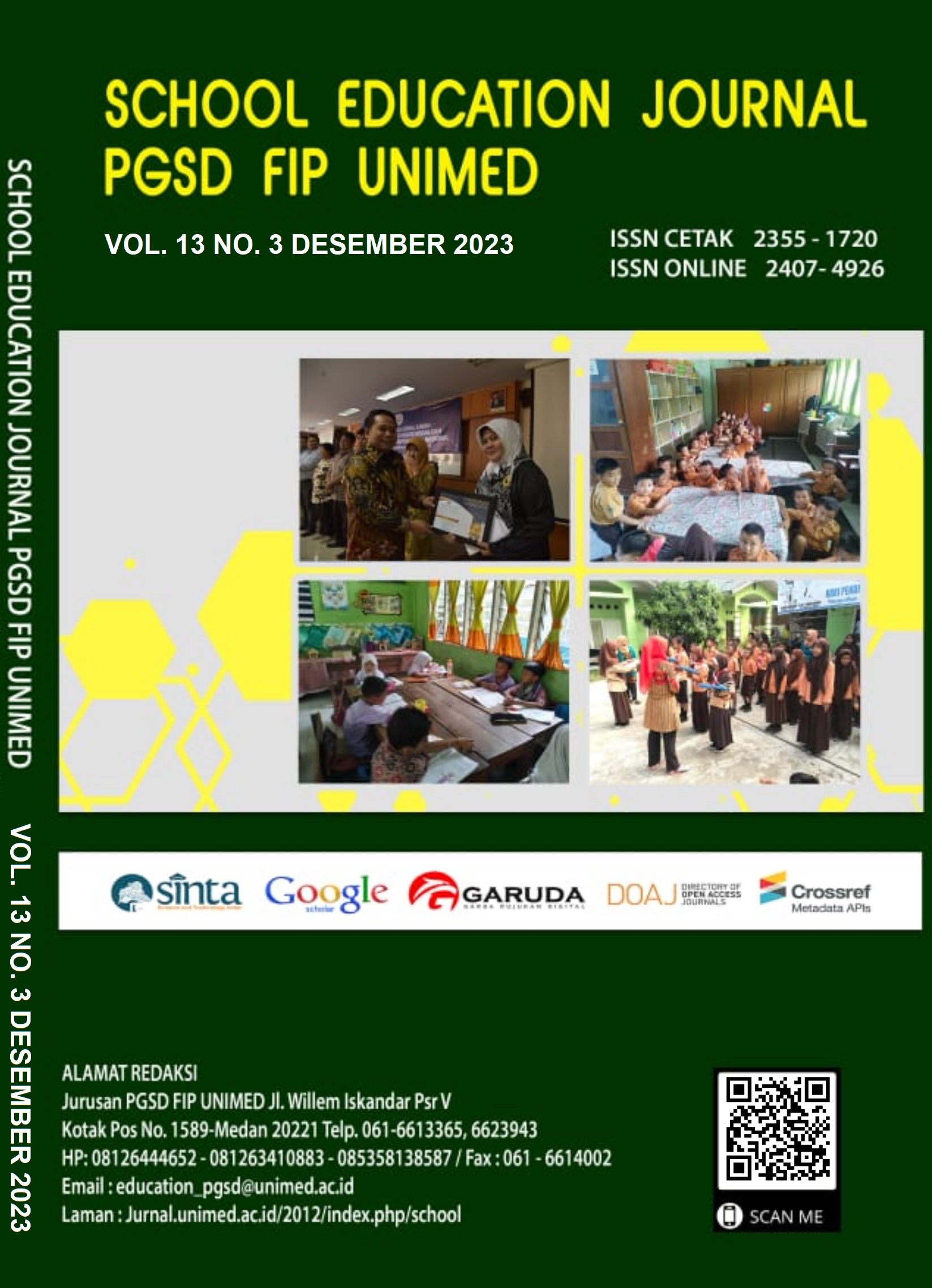PENGEMBANGAN TES FORMATIF DAN SUMATIF PADA MATA PELAJARAN IPAS KELAS IV SEKOLAH DASAR
DOI:
https://doi.org/10.24114/sejpgsd.v13i3.47126Keywords:
Formative and summative tests of science subjectsAbstract
This research has the following objectives: (1) to develop formative and summative tests in grade IV elementary school science subjects; (2) improve evaluation activities in grade IV elementary school science subjects that have not been maximized, especially in formative and summative tests; (3) validate the feasibility of formative and summative test products; (4) validate the practicality of formative and summative test products. The type of research used Research and Development with the ADDIE model (Analysis, Design, Development, Implementation, and Evaluation). Data collection techniques are obtained from observations, interviews, test questionnaires and documentation. Quantitative data analysis of validity and practicality trial results. The progress of student learning outcomes in grade IV elementary school science learning has increased significantly compared to before formative and summative tests were developed. This is evidenced from the results of the educator response questionnaire sheet obtained an average value of 92.71% and student responses obtained an average value of 88.54% in the very practical category.References
Agustina, N. S., Robandi, B., Rosmiati, I., & Maulana, Y. 2022. Analisis Pedagogical Content Knowledge Terhadap buku guru IPAS pada Muatan IPA Sekolah Dasar. 6(5), 9180“9187. https://doi.org/10.31004/basicedu.v6i5.3662
Arikunto, S. 2020. pengaruh hasil tes formatif terhadap hasil tes sumatif. Bandung: Karya Abadi.
Astuti, E. P. 2022. Pengembangan Kurikulum Merdeka Belajar Pada Peningkatan Pemahaman Konsep Penyerbukan dengan Metode Demonstrasi di Kelas 4 SDN Sukorejo 2 Kota Blitar. 3, 671“680. https://jurnaledukasia.org/index.php/edukasia/article/view/177
Faujiah, A. N., Habsah, D., & Tangerang, U. M. 2022. Penerapan Implementasi Desain dan Evaluasi Sumatif di sekolah dasar SDN Pakulan 2 Tanggerang Selatan. 2, 256“265. 10.58578/masaliq.v2i2.298
Haryati, S. 2020. Research and development (r&d) sebagai salah satu model penelitian. 11“26. https://www.academia.edu/15666277/RESEARCH_AND_DEVELOPMENT_R_and_D_SEBAGAI_SALAH_SATU_MODEL_PENELITIAN_DALAM_BIDANG_PENDIDIKAN_Oleh
Marinda, L. 2020. Teori perkembangan kognitif jean piaget dan problematika padaa anan usia sekolah dasar. An-Nisa, 13(1), 116“152. https://doi.org/10.35719/annisa.v13i1.26
Marlina, S., Turnip, A., & Cendana, W. 2021. Implementasi Penilaian Formatif Autentik Era Pembelajaran Daring Berbasis Permainan Digital Sederhana Kelas II Sekolah Dasar. 3(1), 1“11. http://dx.doi.org/10.30742/tpd.v3i1.1454
Nurauni, S. 2022. Implementasi kurikulum merdeka di sekolah penggerak SDN 104231. 4, 7411“7419.
Parepare, M., & Sumatif, T. 2019. Pengembangan tes sumatif mata pelajaran biologi. 6, 53“64.
Putra, G. L. A. K., Tastra, I. D. K., & Suwatra, I. I. W. 2019. Pengembangan Media Video Pembelajaran Dengan Model Addie Pada Pembelajaran Bahasa Inggris Di SDN 1 Selat. Jurnal Edutech Universitas Pendidikan Ganesha, 2(1), 1“10. https://ejournal.undiksha.ac.id/index.php/JEU/article/view/3939
Sjukur B. Sulihin. (n.d.). Dan hasil belajar siswa tingkat smk the effects of blended learning on the learning.2 (November 2012), 368“378.
Susilawati, W. O. 2021. Pengembangan e-modul pembelajaran perkembangan sosial aud berbasis karakter. X(2), 1“18.
Tegeh Kirna, M. 2013. Pengembangan bahan ajar metode penelitian pendidikan dengan ADDEI model. 2.
Tri, E. 2020. Pengaruh tes formatif bentuk multiple choice terhadap kemampuan kognitif peserta didik pada mata pelajaran akidah ahklak.
Wiguna, I. K. W., Adi, M., & Tristaningrat, N. 2022. Langkah Mempercepat Perkembangan Kurikulum Merdeka Belajar. 3(1), 17“26.
Yogi Anggraena, Dion Ginanto, Nisa Felicia, A. H. 2022. Pembelajaran dan Asesmen. https://kurikulum.kemdikbud.go.id/wp-content/uploads/2022/06/Panduan-Pembelajarn-dan-Asesmen.pdf
Downloads
Published
Issue
Section
License
Authors whose manuscripts are approved are approved as follows:
The publication rights for all journal manuscript materials published/published on the SEJ (School Education Journal) E-Journal site are held by the editorial board with the author's knowledge (moral rights remain with the manuscript authors).
The formal legal requirements for accessing this electronic digital journal article are subject to the terms of the Creative Commons Attribution-ShareAlike (CC BY) license, which means that E-Journal SEJ (School Education Journal) has the right to store, transfer media/format, manage in the form of a database, maintain, and publish articles without asking permission from the author as long as the author's name remains as the copyright owner.
Manuscripts published/published electronically are open access for educational, research, and library purposes.

